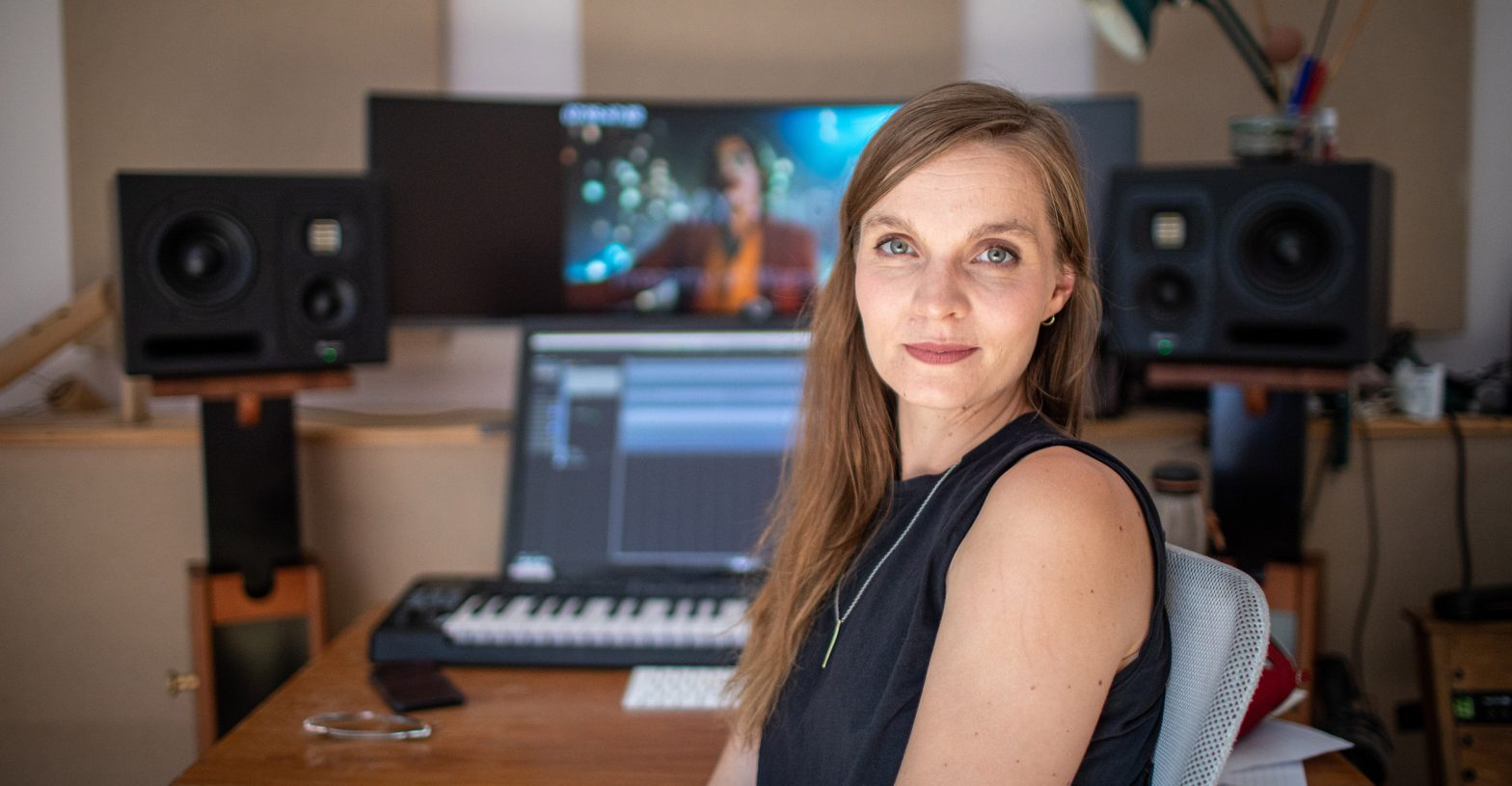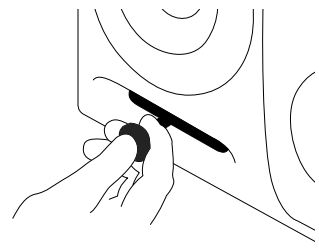HEDD Heinz Electrodynamic Designs

Product Overview
Congratulations on purchasing the HEDD Type 20 MK2 or HEDD Type 30 MK2. You have acquired very precise monitors with a rich feature set. The main features are exchangable use as a Closed or Ported system, as well as the integration of the on-board HEDD Lineariser®. Please head to the specific section to find out more.
As active speakers, the MK2 monitors have an integrated amplifier. You can connect them with a digital interface or analog pre-amplifier. Please refer to the section Getting Started or Speaker Setup to find out more.
Due to their similar nature, this operation manual equally covers the HEDD Type 20 MK2 and HEDD Type 30 MK2 monitors. This manual uses illustrations of the different variants, which thus might not match your exact version in terms of colour or size.
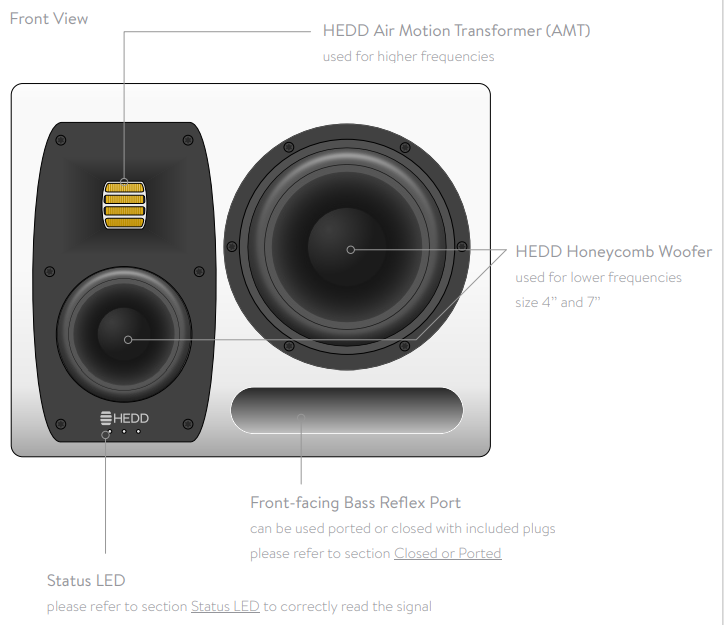
Rear View
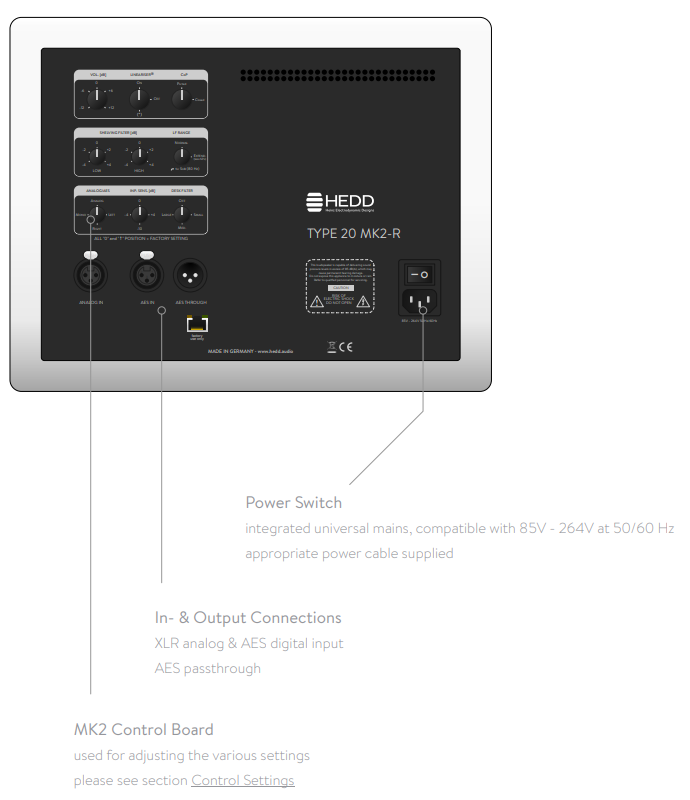
Box Contents
The complete set includes:
- one active monitor Type 20 MK2 or Type 30 MK2
- one power cable compatible with the region from where it was sold
- quickstart guide
- «CoP» leaflet explaining the proper switch from Ported to Closed Mode
- «CoP» screw and plugs to seal the bass reflex ports
Please make sure your box contents match our listing.
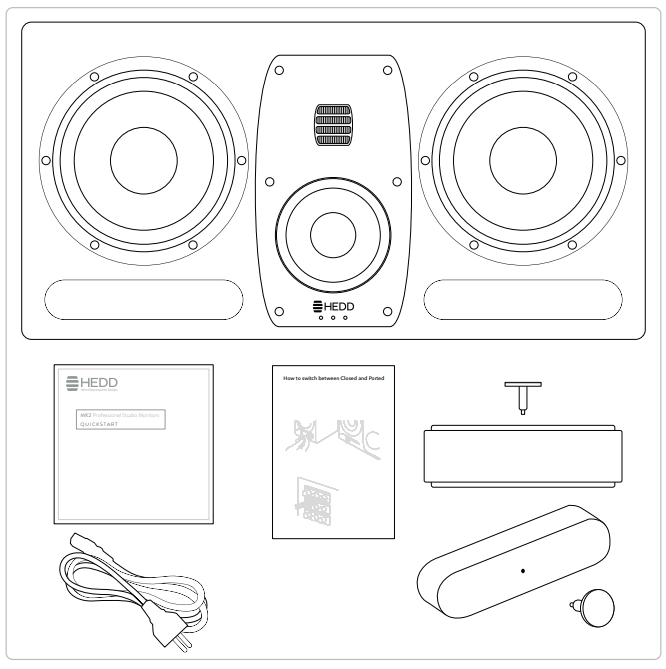
Getting Started
Make sure the main power switch is in the “0” position, then connect the power cord to the power socket.Set the power switch to “1”. Please note that the LED becomes green immediately but it may take up to 15 sec to power up and play music. Warning: High volume may damage your hearing! Consider lowering the volume first.Connect your audio source via the balanced XLR socket, then select the desired input with the ANALOG / AES rotary switch on the back plate (bottom left). For digital AES input, please choose the signal (left, right, mono).As there are quite a number of control knobs on the backplate we recommend to start playing music with all the markers in the “Up” position:
Status LED
The front LED panel of the speaker will indicate its operational status as follows:
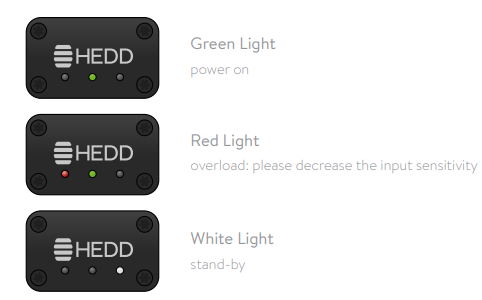
The monitors automatically jump into stand-by after 30 minutes. They wake back up when audio is played.
Speaker Setup
To achieve the best possible sound and unfold the full potential of the HEDD MK2 monitors, the correct speaker placement is very important. Please follow our guide below.
Horizontal Setup
Placing the speaker horizontally is the best way, as they are designed to be placed like this.Always place them on a solid surface or a stand.
Vertical Setup
If you like to place the speaker vertically in a stereo or surround setup, make sure that they are aligned symmetrically: The Tweeters both should face either outwards or inwards.Otherwise, the acoustical image will not be correct.
Height Positioning
Place the speaker in a position so that the tweeter matches the height of your ears when you are on your listening position. If this is not possible, tilt the speaker so that the tweeter aims at your ears. Try to avoid that the tweeter is placed too low or too high, as this may result in a muffled or less defined sound.

Stereo Positioning
For optimizing the stereo listening position, place the two speakers so that they form an equilateral triangle with your listening position. Your listening position should be on an imaginary center point between the two speakers. Adjust the distance of the speakers and the distance of our listening position accordingly to find the best position. Listen to some good known records while adjusting, until you get an authentic stereo panorama.
Surround Positioning
For a surround listening setup, place the speakers in a circle around your listening position in following angles: Center 0°, Front Right 30°, Rear Right 110°, Rear Left 250° and Front Left 330°. Radius of the circle should be between 0.7m – 2m. Surrounding walls should be at least 40cm away from every speaker to avoid early reflections. It is preferrable to use the same type of speaker for every channel (except the subwoofer, of course), because otherwise negative frequency and/or phase coloration can occur. Refer to the ITU recommendation BS.2159-4 for a detailed explanation.
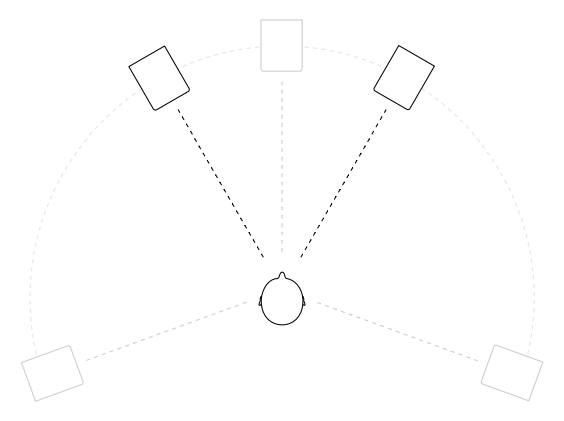
«CoP» Closed or Ported
The HEDD Type 20 MK2 and Type 30 MK2 can be used in either closed or in ported mode. These are two fundamentally different systems that are available for the user to compare and choose. There is no definite better between the two systems. Werecommend to compare carefully to find the optimal option for your environment and listening habits.
Switching Between Closed and Ported
By default, the HEDD speakers are “ported.” This means that the bass port is open. To switch to “closed” mode, please follow the steps below.
- Insert the included HEDD plugs with help of the HEDD screw to close the ports.Make sure that the screw is facing outwards!Push the plugs deep into the bass ports. Make sure that you can still reach the screw comfortable with your fingers to pull it out. The plug should not go deeper than when the bass port starts to bend and the resistance increases. Once inserted, feel free to unwind and remove the screw.

- Switch the knob on the backpanel of your monitors to Closed mode.Please note that the headroom in Closed Mode is limited compared to Ported Mode. We highly recommend to lower the volume before switching.
from Closed to PortedTo switch back to Ported Mode, stop the audio playback, wind the screw back into the plug, gently pull the plug back out again and change the rotary switch on the backpanel to Ported.

Ported Mode

This is the default operating mode. The bass reflex ports are open and allow for a powerful low-end reproduction. This operation mode allows for a higher efficiency and while maintaining access to lower bass regions.
Closed Mode

In closed mode the HEDD MK2 speaker functions as an infinite baffle speaker. This results in a cleaner sound and increased resolution. However, a 6-10 dB reduction in maximum sound pressure level (depending on the audio material) for low frequencies is the consequence.
HEDD Lineariser®
Due to the physically given relationship between time and frequency, expressed in the ground taking harmonic analysis or Fourier transform, different tones have slightly different travelling times through loudspeakers. This is true for both active or passive speakers. Broadly speaking, lower frequencies need more time to pass through than midrange frequencies, and these are slower than the high tones.
Our HEDD Lineariser® offers a complex phase-correction of your HEDD MK2 monitors. It solves one of the most challenging problems in loudspeaker designs, e.g. the natural occurrence of phase difference during multi-component sound reproduction. With the on-board Lineariser®, our monitors are always “right in time”.
The phase-linearisation will improve transients and imaging. To be noted: the correction necessarily will introduce a latency of around 15 ms. To avoid the delay that might affect live recordings or instrument playing the HEDD Lineariser® can be switched off.
Control Settings
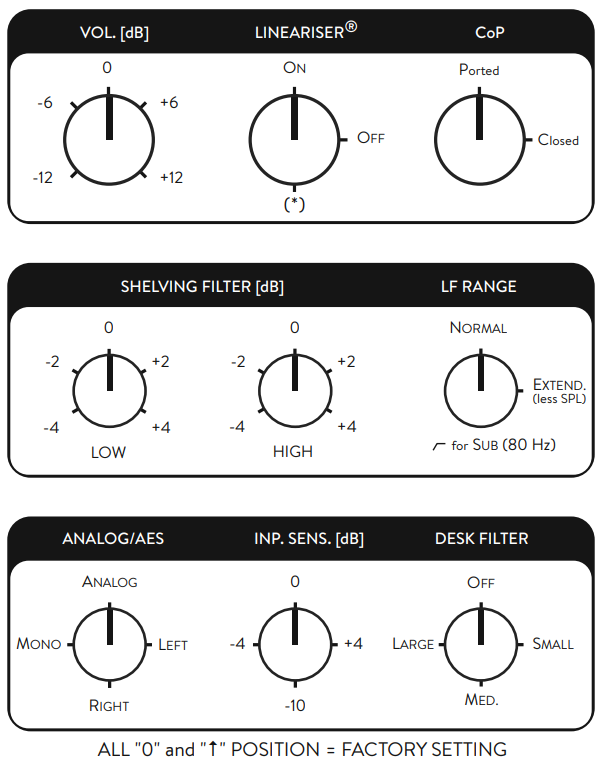
Volume
The output volume rotary switch changes the reproduction level in a ± 12 dB range. We recommend to fine-tune the volume through the connected source like an interface, control board, mixing board or pre-amp.The output volume allows to match the speakers to the audio chain, e.g. lowering SNR or THD. The default setting is 0 dB.
HEDD Lineariser®
By default, the Lineariser rotary switch is turned on. This activates an on-board phasecorrection of our HEDD MK2 monitors.For more information, please refer to the section HEDD Lineariser®.
Closed or Ported
CoP switches the internal system layout according to the selected option. Please make sure that the plugs are correctly inserted for closed mode.For more information, please refer to the section Closed or Ported.
Shelving Filter
Low Shelf: Frequencies between 30 Hz and ~200Hz are increased or reduced in a ±4 dB range in steps of 1 dB. If you have placed your speaker near to a wall or in a corner, you will typically get a boosted bass response. You can use this control for compensating. Or if you place the speaker in a particularly bright room, use the control to get a more balanced sound.High Shelf: Frequencies between 3 kHz and ~20kHz are increased or reduced in a ±4 dB range in steps of 1 dB.
Low Frequency Range
If you choose the extended bass response, the woofer has to deliver much higher amplitudes if very low frequencies occur. As a consequence its maximum sound pressure level (SPLmax) is reduced for low frequencies by 6-10 dB depending on the musical material. The mechanical overload of the woofers is looming much earlier.
The default low frequency range may be adjusted according to specific needs. When set to extended, the low frequency response is extended by ~20 %. In the case of Type 20 and 30 MK2 the -3dB point goes from 32 Hz down to 26 Hz.
In case the monitors are used in a Satellite-Subwoofer system together with our BASS series, the switch has to be set to “for SUB”.
If a BASS 08 or bigger HEDD subwoofer is used, it is preferrable to use the analogue outputs from the sub. The HEDD BASS subwoofers have a Lineariser® on board as well, therefore the overall bass signal is delayed by approximately 30 ms. They are added to the analog output so that an all in all linear phase Satellite-Sub-system is in place. In this very case you may set the switch to “for SUB”.Should the listening distance vary between subwoofer and MK2 monitor with respect to the listening position, you may compensate on that with the “Sat. offset” rotary switch by 2m in .5m steps.
In case the monitors are used in a Satellite-Sub-system together with our BASS series, please use the analog output to the satellites of the BASS 08 or 12 unit to get a completely linear phase Satellite-Sub-system. In case you feed the full range signal toboth the satellites in parallel to any subwoofer (HEDD or other) set the switch to “for SUB”.
Input Selection
This 4-position rotary switch selects which signal to reproduce.“Analog” takes an analog signal from a symmetrical source.The other 3 positions refer to an incoming digital AES signal. Left, Right or Mono can be extracted from the data.
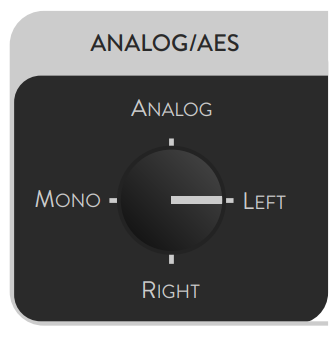
For multi-channel audio that exceeds stereo, for example 5.1 surround sound, the monitors have to be fed through the analog XLR input.
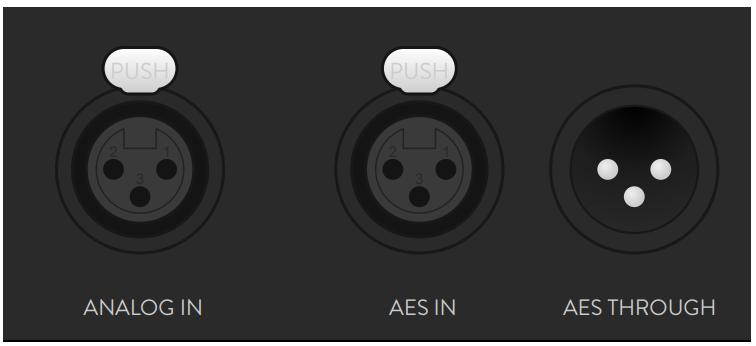
Input Sensitivity
The “Input Sensitivity” rotary switch levels the voltage of the analog input. It can be used to optimize the signal to noise ratio for the A/D converter. In case of weak input signals the gain can be added for up to +4 dB. In case of very loud signals (>2 V) either -4 or -10 dB gain reduction can be applied to avoid an A/D converter overload.The setting has no effect when the signal is received through the digital AES input.
Desk Filter
Monitors sitting on meter bridges or desks may suffer by early reflections from the desk surface that potentially blur the sound. The “Desk Filter” is a 3-position PEQ (Parametric Equaliser) that minimizes the effect. Please note that we cannot give an exact recommendation because the acoustical environments play a vital role. Please find out in how far these filters may improve the sound.
Small up to 80 x 150 cm [d x w]Med. up to 100 x 180 cm [d x w]Large for larger consoles or desktops
Safety Instructions
Please read the following safety instructions carefully before setting up your system. Keep the instructions for subsequent reference. Please read the warnings and follow the instructions.
- To reduce the risk of an electric shock, do not open the loudspeaker yourself. Always refer to qualified service personnel.
- This is an active loudspeaker. It must be connected with an IEC 60320 AC mains power cord like the one supplied with the product.
- Please switch off your audio system before connecting or disconnecting any cables to the speaker – also if you intent to clean the surface or single components. Never use flammable or combustible chemicals for cleaning audio components.
- HEDD studio monitors are equipped with universal mains, meaning that the speakers work within a voltage range from 85–265V. This makes the usual voltage switches unnecessary.
- Do not place this unit on an unstable cart, stand or tripod, bracket or table. The unit may fall, causing serious injury and/or serious damage.
- This product should never be used outside. Avoid exposing it to rain or any sort of moisture.
- Power chords and audio cables connected to this product should never be stepped on.
- Please note that defective cables can harm your speakers and / or create humming, crackling, etc.
- Always keep electric equipment out of the reach of children.
- Always unplug sensitive electronic equipment during lightning storms.
- The monitor should be installed near the socket outlet and disconnection of the device should be easily accessible.
- To completely disconnect the speaker from the AC mains, physically disconnect the power chord.
- Please try to avoid touching the speaker diaphragms. Always keep the woofer’s ventilation ports open.
- Don’t use the speaker at very high or low temperatures. The speakers’ back panel should not be exposed to direct sunlight. Never operate this product in an explosive atmosphere.
- High SPL’s can irreparably damage your ears! Please take good care when working the speakers at high levels.
- Loudspeaker diaphragms are embedded in strong magnetic fields. Magnetic objects (toys etc.) should not be placed or played around with next to the speakers.
- Make sure that the air can circulate behind the speaker as it needs sufficient cooling.
- Only mount this product onto dry and non-conducting walls (wood, plaster). For other wall materials an additional isolation panel is required. To prevent injury, this loudspeaker must be securely attached to the wall in accordance with the installation instructions of your wall mount bracket.
Maintenance and Care
- Your HEDD audio studio monitor doesn’t need any internal maintenance like lubricating, mechanical adjusting and so on, so there is no reason to open up the speaker cabinet. If servicing will be necessary, refer to qualified service personnel.
- For cleaning the surface of the cabinet, we recommend to use a microfiber cloth and simply warm water. Don’t use any aggressive detergent, as it will damage the finish.
- For cleaning dust out of the loudspeaker diaphragms, use a very soft brush.
- Always switch the speaker off before cleaning!
- Make sure that no liquids get inside the cabinet.
- Don’t use flammable or acidic chemicals for cleaning.
Shipping and Packaging
If you need to send your speakers postal, use the original packaging. It’s the safest way to get your speakers from A to B.HEDD Audio GmbH cannot be held responsible for any damage due to improper packaging.
Environmental Information
All our products comply with RoHS and WEEE.If your speaker is seriously broken, please consult your local authorities for further information on proper disposal.
Warranty
We promise that our products are free of defects in material and workmanship for the duration of twenty-four (24) months from the date of the original purchase. This warranty can be extended to thirty-six (36) months if the product is registered with us within the first 6 months after purchase: hedd.link/registration Accessories and any parts that are subject to wear and tear are covered for six (6) months.
The latest updates to our warranty will be accessible online at hedd.audio/warranty/ Please always contact your point of sale first: Please check our list of authorized resellers: https://hedd.audio/store-locator/
Limitations
Please note that inappropriate use voids the warranty and any claims.
Trouble Shooting
| Problem | Solution |
| Green Power-LED is “on” but there is no audio output | 1. Check the wiring and make sure that all cables are connected correctly.
2. Check if you have selected the correct input via the ANALOG/AES switch on the back panel of the speaker. 3. Check the signal path. Swap the cables of both loud- speakers. You might have one defective signal cable. 4. Connect an audio source directly to the speaker (pay attention to the volume!). If you now have audio output, the malfunction is in your signal path. 5. If the back panel of the speaker is very hot, it may be that the internal thermal protection of the amplifiers has shut down the audio output to prevent electrical damage. Turn the unit off, let it cool down and repower. |
| There is a hum or buzz noise in the output | 1. Disconnect all signal cables. If the noise is gone, check your audio cables and the equipment of your signal path. If you are using the balanced XLR input, try to activate Ground Lift on your signal source.
2. If there is still noise, check if you have any other electrical devices that potentially produce high amounts of RFI (cellphones, switching power supplies, radio equipment) next to your speakers. If so, move them further away. |
| Red Overload-LED lights up constantly | Reduce the input audio level either on the source or with the GAIN control on the back panel of the speaker |
| Speakers vary in output volume | Use the GAIN control to compensate for any level differences |
If none of these advices solves the problem, the speaker might be faulty. If you need further assistance, please contact us directly: [email protected]
Technical Specifications
| HEDD Studio Monitors MK2 | TYPE 20 MK2 | TYPE 30 MK2 |
| Woofer (honeycomb diaphragm) | 7’’ (2’’ voice coil) | 7’’ (2’’ voice coil) |
| Midrange (honeycomb diaphragm) | 4’’ (1.25’’ voice coil) | 4’’ (1.25’’ voice coil) |
| Tweeter | HEDD AMT | HEDD AMT |
| Crossover frequencies (48 db/oct) | 250 Hz / 3.2 kHz | 250 Hz / 3.2 kHz |
| Input analog / digital (AES) | 1x / 1x XLR | 1x / 1x XLR |
| Input impedance (balanced) | 22 kΩ | 22 kΩ |
| Input gain | ± 12 dB | ± 12 dB |
| Input sensitivity (A/D modulation) | -10 /-4 / 0 / +4 dB | -10 /-4 / 0 / +4 dB |
| Output: AES “through” | XLR | XLR |
| HEDD Lineariser®, disengageable, delay | 10 ms | 10 ms |
| Shelve filters high / low (.5 dB steps) | ± 4 dB | ± 4 dB |
| LF range (-3 dB): normal / extended / satellite | 32 / 26 / 80 Hz | 32 / 26 / 80 Hz |
| Desk filter: small / medium / large (180 Hz) | -1 / -2 / -4 dB | -1 / -2 / -4 dB |
| Frequency response (-3 dB) | 32 – 40 000 Hz | 32 – 40 000 Hz |
| Maximum SPL (per pair) | 120 dB | 125 dB |
| Power amplifier 110 – 240 V | 3x 300 W | 3x 300 W |
| AD/DA Conversion | 96 kHz / 32 Bit | 96 kHz / 32 Bit |
| Cabinet with satin lacquer finish | black or white | black or white |
| Dimensions in mm (H x W x D) | 280 x 358 x 338 | 280 x 530 x 338 |
| Weight | 15.4 kg | 21.5 kg |
| Warranty | 2 years | 2 years |
HEDD | Heinz ElectroDynamic Designs is a high-end audio manufacturer founded by Klaus Heinz and Dr. Frederik Knop. Drawing on a rich history in audio creation and reproduction, the German company builds handcrafted professional studio monitors, subwoofers, and headphones in Berlin since 2016. HEDD’s advantage is the in-house developed signature Air Motion Transformer driver.

References
[xyz-ips snippet=”download-snippet”]

